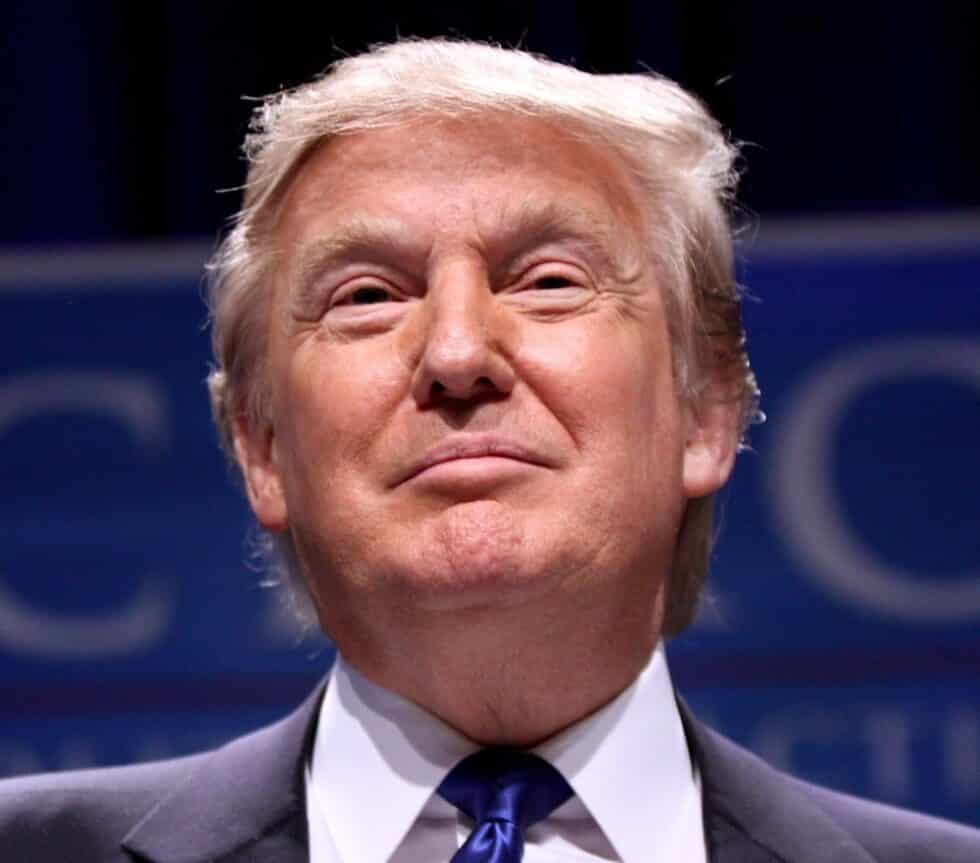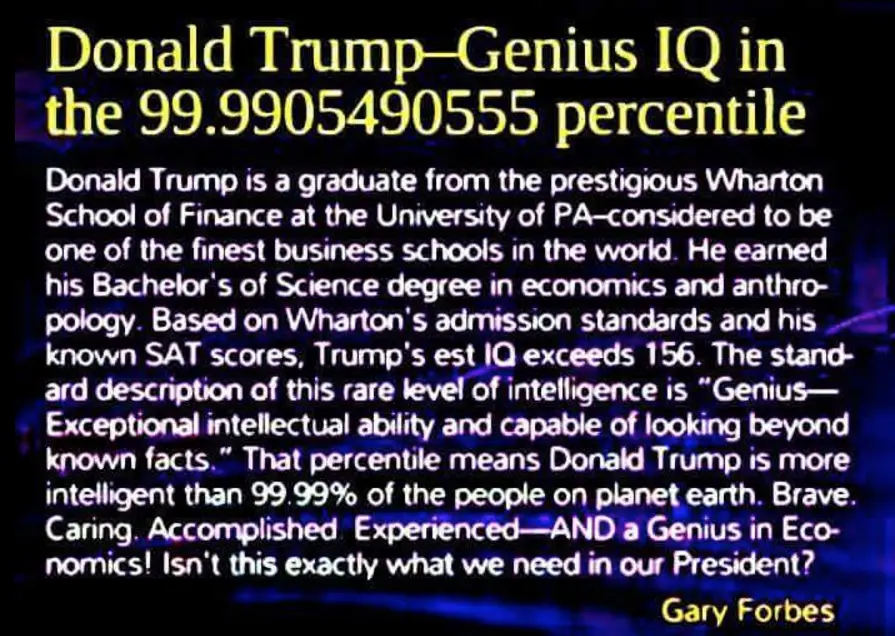Ever since Donald Trump stepped into the spotlight, his IQ has been a hot topic of conversation. Whether you're a fan or a critic, it's hard to ignore the debate surrounding his cognitive abilities. From his time as the President of the United States to his years as a businessman and TV personality, people have been fascinated by what makes him tick. This discussion has sparked both skepticism and admiration, drawing in everyone from academics to everyday folks.
Donald Trump is one of those figures who divides a room. His leadership style, the way he makes decisions, and how he communicates have always been under a microscope. His speeches, tweets, and public appearances often bring attention to his intellectual capabilities. Some people applaud his business instincts and problem-solving skills, while others question whether he fully grasps complex issues or thinks critically about them. It's a debate that won't go away anytime soon.
In this article, we're diving deep into the controversy around Donald Trump's IQ. We'll explore the claims, counterclaims, and evidence out there. By looking at both the science behind IQ and what people are saying in the media, we'll try to make sense of this heated issue. Our goal is to keep things balanced and grounded in facts. So, let's get started.
Read also:Goonies Monster The Unseen Villain That Left Us Spellbound
Table of Contents
- The Story of Donald Trump
- What's the Deal with IQ Anyway?
- Trump's Take on His Own IQ
- What Science Has to Say About IQ
- What Do People Really Think?
- Psychologists Weigh In
- How Does This Affect Politics?
- Why the IQ Debate Might Be a Distraction
- Experts Share Their Thoughts
- Final Thoughts
The Story of Donald Trump
From Queens to the White House
Donald John Trump was born on June 14, 1946, in Queens, New York. He's the fourth child of Fred and Mary Trump. Even as a kid, Trump seemed destined for business, following in the footsteps of his dad, who was a successful real estate developer. Trump attended the New York Military Academy and later earned a degree in economics from the Wharton School of the University of Pennsylvania in 1968. His journey from real estate mogul to TV star to President of the United States is nothing short of remarkable.
Here's a quick rundown of his life:
| Full Name | Donald John Trump |
|---|---|
| Birthdate | June 14, 1946 |
| Birthplace | Queens, New York |
| Profession | Businessman, Television Personality, and Former President of the United States |
| Education | Wharton School of the University of Pennsylvania (1968) |
What's the Deal with IQ Anyway?
Breaking Down Intelligence Quotient
Let's talk about IQ. It stands for Intelligence Quotient, and it's a score you get from tests designed to measure your cognitive abilities. These tests look at things like logical reasoning, problem-solving, and how well you understand language. But here's the thing—IQ doesn't tell the whole story. It doesn't measure emotional intelligence, creativity, or practical skills. Those are all important parts of being smart too.
Even though IQ has its limits, it's still widely used in schools and workplaces. The debate around Trump's IQ shows just how much people are fascinated by the idea of quantifying intelligence. But is it really the best way to understand someone's capabilities? That's the million-dollar question.
Trump's Take on His Own IQ
What He's Said and What It Means
Over the years, Donald Trump has made some bold claims about his IQ. He's said he has a "very high IQ" and that his success is all thanks to his sharp mind. But here's the catch—he's never actually shared his real IQ score with the public. Critics have been quick to point out that IQ isn't the only thing that determines success in business or politics. And let's be honest, the media loves to speculate about his intelligence based on his public behavior and statements.
So, what are the key points in this debate? First, Trump hasn't been transparent about his actual IQ. Second, experts argue that IQ alone doesn't define success. And finally, the media has had a field day analyzing his intelligence. It's a complicated issue with lots of angles to consider.
Read also:Fry 99com Your Ultimate Guide To Online Cooking Mastery
What Science Has to Say About IQ
How IQ Tests Really Work
From a scientific standpoint, IQ tests are designed to measure specific cognitive abilities, but they're not perfect. Things like the testing environment, cultural background, and even how well someone handles tests can all affect the results. Intelligence is a lot more complicated than a single number can capture. It's multifaceted, involving everything from logical thinking to emotional awareness.
Research shows that while IQ can predict certain things, like how well someone will do in school, it's not the only factor in determining success in life. Emotional intelligence, the ability to adapt, and perseverance often play just as big a role in achieving personal and professional goals. It's a reminder that there's more to intelligence than meets the eye.
What Do People Really Think?
How the Public Views Trump's Intelligence
When it comes to Donald Trump's IQ, public opinion is all over the place. His supporters think he's a genius, while his critics question whether he's intellectually capable. The media hasn't helped matters, with some outlets portraying him as incredibly smart and others painting him as intellectually deficient. A 2020 survey by the Pew Research Center found that Americans are deeply divided on this issue, with political affiliation playing a big role in shaping opinions. This divide reflects the broader cultural and ideological splits in our society today.
Psychologists Weigh In
What the Experts Are Saying
Psychologists and cognitive scientists have taken a closer look at Donald Trump's cognitive abilities. Some think his decision-making style leans more on intuition rather than careful analysis, while others point to his ability to adapt quickly as proof of his mental agility. His communication style is often simple and repetitive, which some experts say is a way for him to connect with a wide audience. His use of social media platforms like Twitter has also been both praised and criticized, showing the dual nature of his approach to thinking and communicating.
How Does This Affect Politics?
What It Means for Leadership and Governance
The debate around Donald Trump's IQ has big implications for politics. Critics argue that a leader's cognitive abilities are essential for effective governance, especially in today's fast-paced and complex world. On the flip side, supporters believe that traditional measures of intelligence might not matter as much when evaluating leadership qualities. Historically, political leaders have been judged on their ability to inspire, make tough decisions, and navigate challenges. While IQ might be part of the equation, it's not the only thing that determines success in leadership roles.
Why the IQ Debate Might Be a Distraction
Is This Really the Most Important Conversation?
Some critics think the focus on Donald Trump's IQ takes attention away from more important issues, like his policies and how he governs. They believe that reducing someone's intelligence to a single number oversimplifies the complexity of human intelligence and ignores the bigger picture of leadership and decision-making. The IQ debate can also perpetuate stereotypes and reinforce societal biases about what it means to be intelligent and successful. By shifting the conversation to focus on skills, experience, and character, we can have a more meaningful discussion about what makes a good leader.
Experts Share Their Thoughts
What the Pros Have to Say
Experts in psychology, neuroscience, and political science have chimed in on the controversy surrounding Donald Trump's IQ. While opinions vary, most agree that intelligence is a multifaceted trait that can't be summed up by a single number. For example, Dr. Daniel Kahneman, a Nobel laureate in economics, suggests that intuition and experience are crucial in decision-making. Dr. Carol Dweck, a leading expert on mindset theory, emphasizes the importance of having a growth mindset to achieve success. These insights remind us that we need a more complete understanding of intelligence and its role in leadership.
Final Thoughts
The debate around Donald Trump's IQ taps into larger conversations about intelligence, leadership, and success. While IQ can be useful in certain situations, it's not the only thing that defines someone's capabilities or potential. By looking at both the science and what people are saying, we can get a better grasp of this complex issue. We'd love to hear your thoughts in the comments below. And if you're interested in exploring more topics like this, check out our other articles for in-depth analyses of contemporary issues. Let's keep the conversation going and work toward a more thoughtful and informed discussion about intelligence and leadership.


